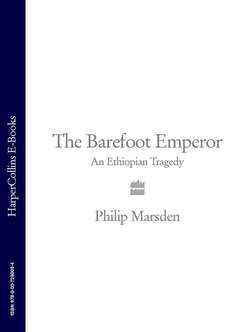Читать книгу The Barefoot Emperor: An Ethiopian Tragedy - Philip Marsden - Страница 7
GLOSSARY
Оглавлениеabet – a greeting call, used to attract attention, or to acknowledge such a call
abun, abune – the head of the Ethiopian Orthodox Church, at this time always a Copt
adarash – meeting hall
afe-negus – literally ‘mouth of the king’, royal spokesman
aleqa – chief or head
alga – bed, wooden-framed and sprung with a lattice of leather straps; also means throne
amba – a flat-topped mountain peak, often surrounded by cliffs, a natural fortress or isolated site for a monastic community
ato – Mister
Ayzore! – ‘Be strong!’ Comradely call of encouragement in battle, travel or labour
azmari – minstrel, composer and singer of witty verses, accompanied by masenqo, single-stringed fiddle
balderada – a chaperon and translator appointed to assist foreign visitors at the Ethiopian court
basha – from the Turkish ‘pasha’, used for high officials, and with irony in the case of Captain Speedy (‘Basha Felika’)
belg – the ‘small’ rains, usually occurring between late January and early March
bitwedded – ‘favourite’, court title, used often as qualifier to other titles like ras
debtera – a non-ordained rank of the Ethiopian Church, responsible for singing and dancing, and often possessed of peripheral religious powers, as herbalist and spell-maker
dejazmach – literally ‘commander of the gate’, a military and noble rank just below ras
doomfata –the recital of heroic deeds
falasha –an Ethiopian Jew
farenj –foreigner (adjectival form – farenji)
Fekkare Iyesus –The Interpretation of Jesus, Ethiopian sacred text
Fetha Negest – ‘laws of the kings’, the book of Ethiopian law
fitawrari – ‘commander of the front’or ‘vanguard’
Galla –former name of the Oromo people, originally pastoralists from the southern and eastern highlands
giraf –hippo-hide whip
godjo –stone-built hut typical of Tigray and the north of Ethiopia
grazmach –literally ‘leader of the left’, military and noble rank below dejazmach
gugs –a game of mock combat, involving two teams of horsemen charging each other: beautiful to watch, hazardous to play
Habesh –the name Ethiopians often use for themselves, from the Arabic ‘mixed’, and the basis of the name ‘Abyssinia’
hakim –doctor
hudaddie –Lenten fast, fifty-six days long
ichege –head monk of Ethiopia, and being native often more powerful than the Coptic abun
ika-bet – ‘thing house’, repository of church treasures
injera – flat bread
isshi – ubiquitous Amharic expression, meaning OK/of course/ very well
itege – empress or queen
Jan Hoi –Your Majesty
kebbero – large church drum
Kebre Negest – ‘the glory of the kings’, Ethiopia’s mythical charter dating to about the thirteenth century, drawing together many myths including the story of Solomon, Sheba and Menelik their son, and the Ethiopian inheritance of Mosaic law and the Ark of the Covenant
kegnazmach – literally ‘leader of the right’, military and noble rank below dejazmach
kentiba – mayor
kiddus – saint or holy man
kinkob – ceremonial robe
koso – a purgative against intestinal worms, used regularly by Ethiopian highlanders
lemd – cape or tunic
lij – ‘son’ or ‘child’, used as title for young noble males
liqemekwas – high court official
margaf – cotton scarf or small shawl
mekdes – the sanctuary of a church, the section in which is housed the tabot
mesob – free-standing flat-topped basket, on which is spread injera
naib – a Turkish name for the local rulers of the coastal region around Massawa
negarit – war drum, used to call men to arms, as well as acting as a symbol of authority
negus – king
shamma – large cotton shawl
shifta – bandit
shum – regional ruler, military chief
tabot – the sacred object at the heart of each Ethiopian church, never seen by laymen, representing both the Ark of the Covenant and the church’s given saint
tankwa – boat of lashed-together papyrus, used on Lake Tana
teff – indigenous Ethiopian wheat used to make injera
tej – mead
tella bet – beer house
thaler – the Maria Theresa thaler, common currency of the highlands, minted without alloy, and equivalent to about six shillings at this time
Tigrigna – the language of Tigray, northern Ethiopia, derived as Amharic from Ge’ez and the Semitic family of languages
timtim – white turban worn by priests
wat – sauce
weyzero – Mrs
